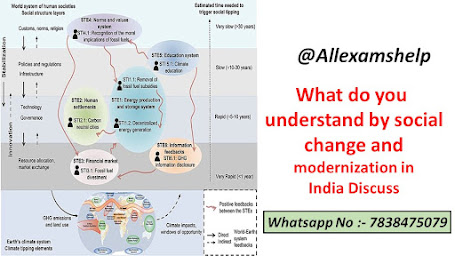Social change refers to the transformation of societal structures, cultural patterns, and values over time. It is a process that occurs in response to various factors, including technological advancements, economic development, political shifts, and cultural exchange.
What
do you understand by social change and modernization in India Discuss
Modernization,
on the other hand, refers to the adoption of modern practices and ideas,
including technology, industrialization, urbanization, and secularism. It
involves the transformation of traditional societies to become more modern and
industrialized.
In the Indian
context, social change and modernization have been significant processes that
have shaped the country's history and current state. India has undergone
significant changes in the last few decades, with rapid economic growth and urbanization
leading to substantial changes in the country's social and cultural fabric.
Some examples
of social change and modernization in India include the growth of the IT
sector, the rise of the middle class, the expansion of education and
healthcare, and the increasing influence of Western values and consumerism.
These changes have had both positive and negative impacts on Indian society,
and their effects continue to be felt today.
Social change
refers to the process by which societies undergo significant transformations in
their cultural patterns, institutions, behaviors, and relationships. These
changes can occur in response to various factors, such as technological
advancements, economic development, political movements, demographic shifts, or
cultural exchange.
Social change
can take different forms, ranging from gradual and incremental changes to rapid
and dramatic shifts. It can also occur at different levels, including
individual, community, national, or global levels.
Some examples
of social change include the rise of social media, the shift in gender roles
and expectations, the growth of multiculturalism, and the emergence of new
forms of social and political activism. Social change can have both positive
and negative consequences, depending on the context and perspective of those
affected.
Social change
is an ongoing process, and it is shaped by various factors and forces that
influence the direction, speed, and outcomes of the transformation.
Understanding social change is essential for individuals, organizations, and
societies to adapt and respond to the challenges and opportunities presented by
a rapidly changing world.
Modernization
in India refers to the process of economic, social, and cultural transformation
that has taken place in the country since independence in 1947. India has
undergone a series of changes that have led to its transformation from a
predominantly agricultural society to a more industrialized and
service-oriented economy.
The
modernization process in India has been characterized by various factors,
including technological advancements, urbanization, economic liberalization,
and globalization. These factors have led to significant improvements in
India's infrastructure, education, healthcare, and other areas of social
development.
One of the key
drivers of modernization in India has been the growth of the information
technology sector, which has led to the creation of new job opportunities,
increased foreign investment, and a rise in India's global competitiveness.
India has become a hub for IT services, with cities like Bangalore, Hyderabad,
and Chennai known for their tech industries.
The growth of
India's middle class has also been a key aspect of the country's modernization.
The rising income levels have led to increased demand for consumer goods, and
have created new opportunities for businesses in areas such as retail, housing,
and transportation.
However, the modernization process in India has also had its challenges. Rapid urbanization has led to issues such as congestion, pollution, and inadequate infrastructure in some areas. There have also been concerns about the impact of modernization on traditional Indian culture and social structures.
For SOLVED PDF & Handwritten
WhatsApp No :- 7838475019
Despite these challenges, the modernization process in India has led to significant improvements in the country's social and economic indicators. Poverty rates have declined, life expectancy has increased, and literacy rates have improved. India has emerged as a major player in the global economy, with a diverse and growing industrial base, a skilled workforce, and a large consumer market.
